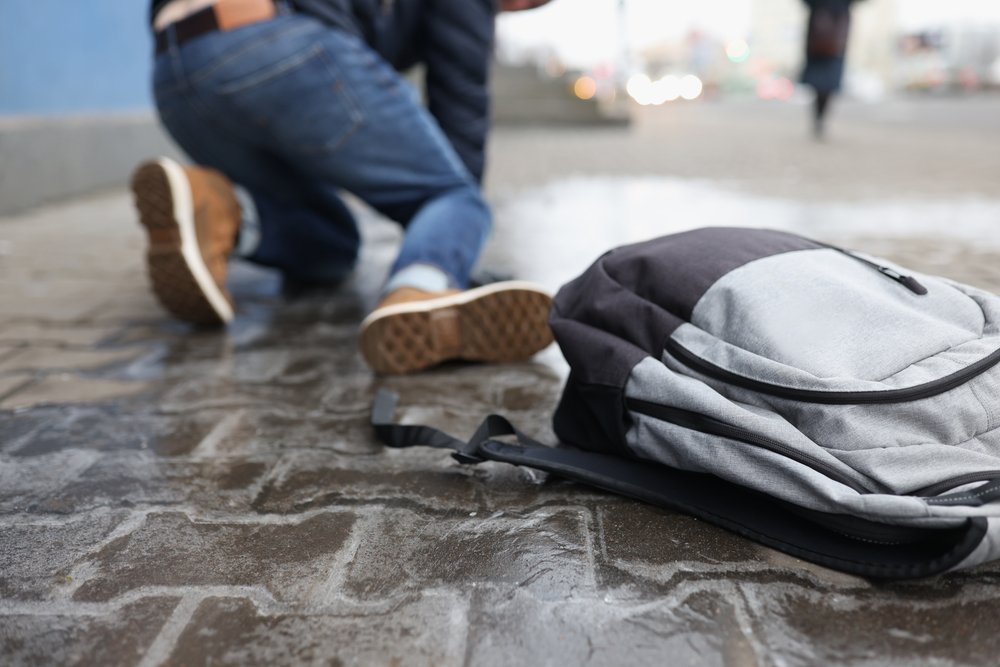Slip-and-fall accidents can cause serious harm to pedestrians, and these accidents are more common during winter due to snow and ice. Often, snow and ice can be tough to spot, and if you slip on these slick surfaces, you may suffer from severe or even permanently disabling injuries.
If you suffer from a snow or ice slip-and-fall injury on private property, you may be able to recover compensation for your injuries. Here’s what you need to know about liability in winter slip-and-fall accidents.
Common Winter Slip-and-Fall Injuries
A hard fall can cause a victim to experience numerous different types of injuries. Whether these injuries are serious or minor, you have every right to file a claim or lawsuit to receive compensation if the property owner is liable. You may be able to recover damages for your medical expenses, and if you were forced to miss work due to your injuries, you could recover damages for lost wages and loss of future earnings.
Some common types of wintertime slip-and-fall injuries include:
- Concussions or more serious traumatic brain injuries
- Spinal cord injuries, which can result in paralysis
- Internal injuries
- Broken bones
- Back injuries
- Neck injuries
- Soft-tissue injuries
- Strains, sprains, and tears
- Contusions
Wintertime Premises Liability
If you suffer from a serious slip-and-fall injury, you may wonder who is liable. Slip and falls on private property fall under premises liability law. Premises liability means that private property owners have a responsibility to ensure that their property is safe for visitors and patrons, and this includes both residential property and commercial property.
Snow and ice are considered hazardous conditions that may cause a person to slip and fall, and when someone slips due to a hazardous condition, the private property owner may be liable for their injuries.
There are a few conditions that may impact one’s ability to recover compensation for slip-and-fall injuries on private property. The property owner must be aware that the hazardous condition exists, and the property owner can avoid liability by warning others of the potential hazard. For example, if a patron tracks slippery snow into a grocery store, the store owner could avoid liability by leaving out a “Wet Floor” sign.
Proving whether or not a property owner is aware of a hazardous condition is often tricky because someone could claim they were unaware in order to avoid paying for someone else’s damages. If the property owner should have been aware of the hazard, they may still be held liable. For example, if a grocery store’s parking lot is full of slippery ice that’s been on the pavement for hours, the store owner could still be liable even if they claim they were unaware of the hazardous condition.
Slipping at a Private Residence
Your ability to recover compensation for your winter slip-and-fall injury will likely depend on whether you slip at a commercial property or a private residence.
When it comes to private residences, the degree to which private homeowners need to keep their sidewalks and driveways clear of hazardous snow and ice will depend on where they live. Indiana does not have a state law that requires private homeowners to shovel their sidewalks, but certain cities and counties do have rules regarding clearing snow.
That said, if a person slips on someone else’s driveway or sidewalk, it’s possible to prove negligence and recover compensation, but proving it can be challenging during winter weather. The property owner could have been unaware of the hazard because snow and ice can accumulate quickly.
If you’re the victim of a slip-and-fall accident, the burden of proof is on you to prove that the property owner was aware of the hazard, and with sudden ice and snow formulating, the property owner can likely convince a courtroom that they were unaware of the hazard.
Suffering From a Slip-and-Fall Injury on Commercial Property
It’s far easier to prove your wintertime slip-and-fall injury case when you slip on commercial property because Indiana law has higher standards for businesses.
In Indiana, property owners must receive actual or constructive notice to be held accountable for premises liability. An example of actual notice is a customer informing an employee of a hazardous condition. When a business receives notice of a hazard, its legal responsibility is to remedy it or inform the public about the potential danger.
Constructive notice means that the business owner should have been aware of the hazard. For example, if it snowed the night before, the property owner should be aware that there are likely potential slip-and-fall hazards in the establishment’s parking lot.
When a victim files a slip-and-fall lawsuit against a business, courts will usually consider how long the snow or ice was on the property and the amount of notice the property owner had leading up to the dangerous weather conditions.
The court will also likely consider whether winter slip-and-fall accidents have already occurred on the property. If someone had previously suffered from a fall due to snow and ice, the court may consider the property owner liable because they should have been aware that the hazardous situation may occur again in similar weather conditions.
Contact a Slip-and-Fall Accident Attorney
Navigating the complexities of premises liability is challenging, but you don’t need to go it alone — contact an Indiana slip-and-fall accident attorney.
Here at Flores Law Group, we can assist you with your slip-and-fall case. Depending on your case, we can help you prove that a private property owner was liable for your injuries, and we’ll work to maximize the amount of compensation that you can receive for medical bills, lost wages, pain and suffering, and more. Call us today at 317-900-2556 for a free case consultation.

